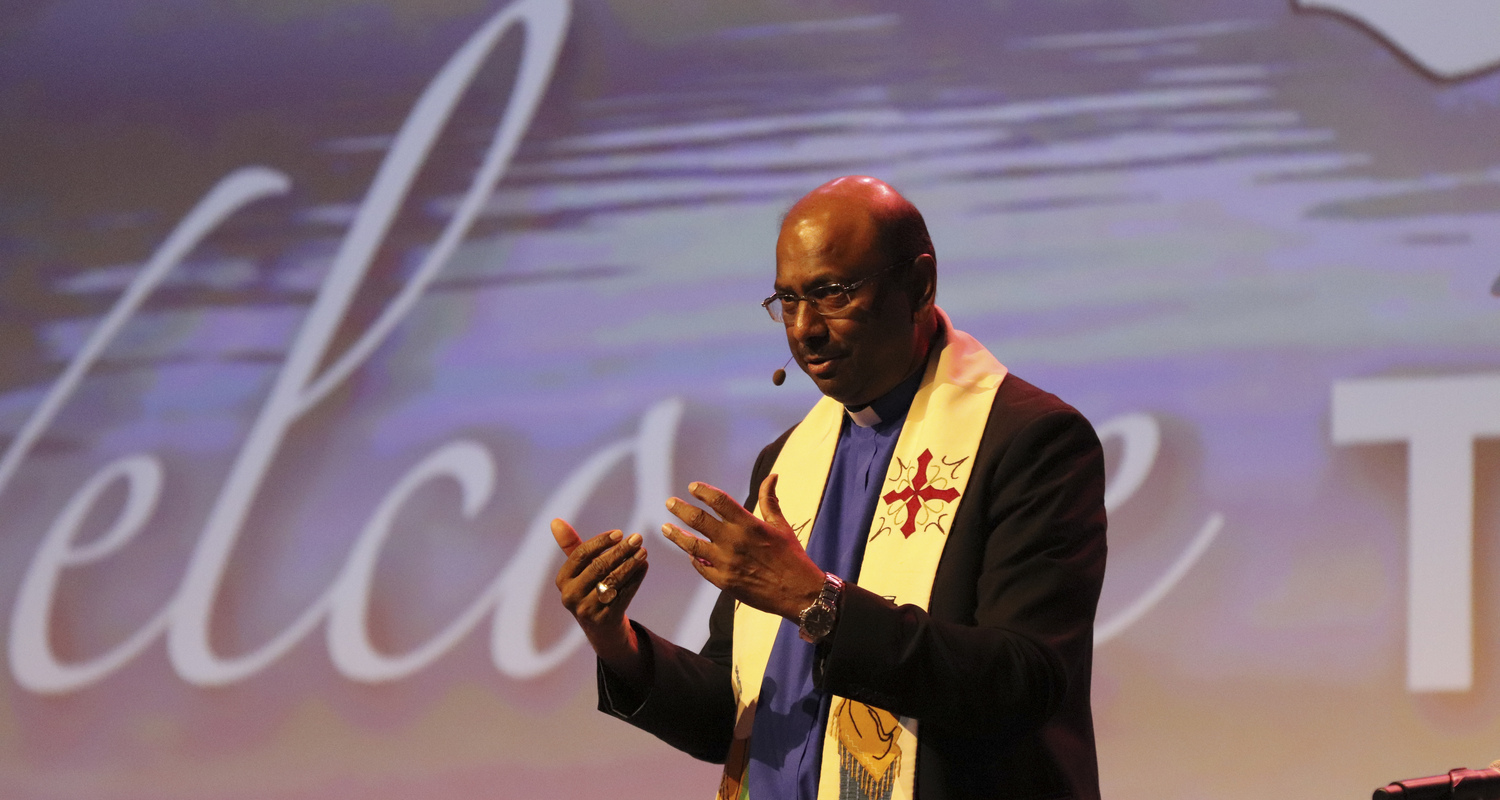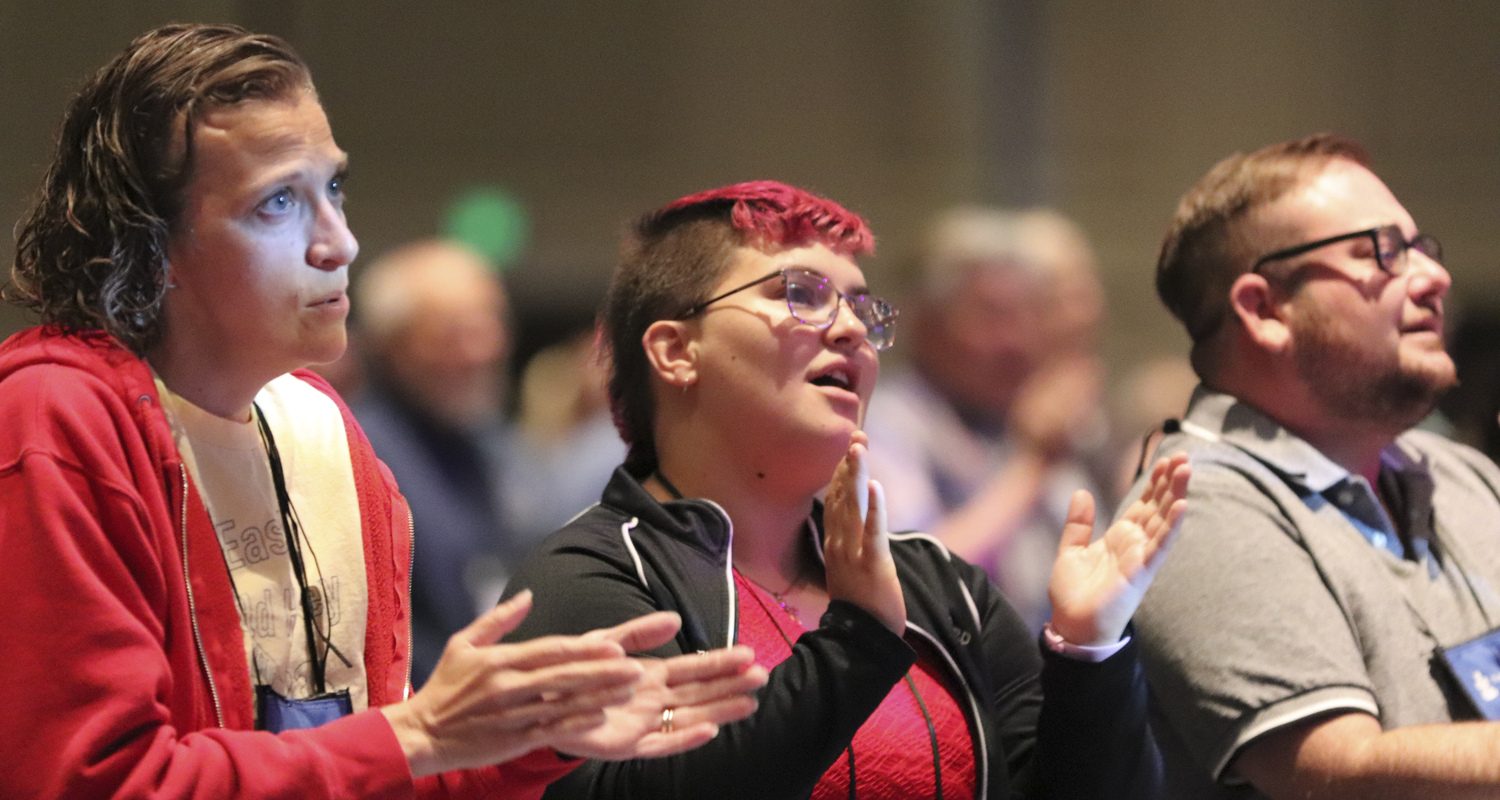
The Rev. Prof. Dr. Jerry Pillay, general secretary of the World Council of Churches (WCC), delivered the sermon titled, “Live into Hope,” during the Ecumenical service of worship on July 2, 2024. Photo by Kristen Gaydos
An ecumenical worship service led Tuesday’s General Assembly morning session. Inspired by the Assembly’s theme, “Live Into Hope,” the Rev. Prof. Dr. Jerry Pillay, general secretary of the World Council of Churches (WCC), thanked the delegates and congregants for decades of faithful support of the ecumenical movement and the WCC. He brought greetings from WCC member churches in 120 countries around the world.
“My sisters and brothers in Christ, it is my great privilege and joy to be with you today in the bond of ecumenical fellowship in our common worship of the God of life and hope.”
Pillay’s sermon, titled “Live Into Hope: The Right to Be,” focused on three points about Christian freedom and its impact on hope. Specifically, that Christian freedom is:
- Characterized by liberty,
- Characterized by love and hope,
- Life in the spirit.
Pillay opened his sermon with a story about two kites, both tied to a string, but one wishing to be set free to achieve freedom and its full potential. When it receives its wish, its freedom lasts briefly before getting stuck on a wire, only to hope it could be with its friend once again.
Hope “is not some shoddy sensational feeling, a romantic gesture or a shallow experience. Instead, it is grounded in the historical suffering, death, resurrection and ascension of our Lord, Jesus Christ. This hope is real and now, even though it is something of the future.”
Pillay noted that the apostle Paul tells us our freedom is in Christ.
“But we need to know what Christ stands for. When we understand the Scriptures correctly, we discover that Jesus brings love and forgiveness, redemption and restoration, justice and peace, acceptance and inclusion, compassion and mercy. He comes to give life and hope.”
Freedom does not mean that we are without ties and obligations, noted Pillay. Paul suggests that instead of being enslaved to sin, we should be enslaved to righteousness.
“It is Christ Jesus who gives us the strength to overcome. The apostle Paul says we are always enslaved to something. The purpose of Paul’s epistle to the church in Galatians is to remind the church that Christianity is not about legalism, which leads to bondage and slavery, but rather about freedom and liberty.”

GA226 commissioners and advisory delegates attended the Ecumenical service of worship on July 2, 2024. Photo by Kristen Gaydos
“Paul was attempting to stress the new freedom availed to those who believed in Jesus Christ,” said Pillay. “We are set free indeed by the risen Lord.”
According to Paul, noted Pillay, our freedom is not in freedom itself but in Jesus Christ.
“Our freedom is to be found in the one who sets us free from sin, oppressive laws, the works of Satan and the powers of death. If the Son shall set you free, you shall be free indeed. We are like that kite — even though we have our freedom to fly, we are attached to Jesus, and as long as we remain attached to him, we are safe.”
Paul reminds the church of this in Galatians 5:13 when he says, “You, my brothers, were called to be free. But do not use your freedom to indulge in sinful nature; rather, serve one another in love.”
Pillay noted that we don’t need to look far to meet the “outcasts” in today’s world, mentioning migrants fleeing violence in search of security, LGBTQ+ people being assailed, the economically disadvantaged, and those still suffering from the legacies of slavery and colonial conquest.
“Doing justice with and for the marginalized will entail sacrifice on our part. We must transcend comforts and even the reassurances of ‘church’ to embrace the costly imperatives of discipleship. It means heeding the call to God, nurturing hope through committed engagement with and for the marginalized. It is loving God and neighbor as yourself.”
He concluded, “The radicality of Jesus’ call cannot be overstated. Yet such bold witness is hardly unknown in the PC(USA), whose very founding struck a historic chord for freedom against slavery.”
Pillay told worshipers that, like Jesus, they must let themselves be moved by the Spirit to live into hope and find their identity in God and God’s plan for humanity. While acknowledging it won’t be easy, he preached that “living in the Spirit enables, empowers and fuels hope. Amidst hopelessness, fear and despair, we can trust God for the present and the future that all will be well. The hungry will be fed, the oppressed set free, the weak strengthened, the downcast raised up and wars will cease.”
“We live with resurrection hope,” he continued. “Hope that Creation will be restored. Hope that justice will come. Hope that peace will come. Hope that forgiveness and healing will take place. Hope that we will all be one in Christ.”
Pillay concluded the sermon by referring to the kite story, saying that one day a strong wind blew it down, and it was found and repaired, after which it met up with its long-lost friend.
“I never want to let loose of this string again; this is my freedom.”
“The Holy Spirit constantly blows on us and brings us into the love of Christ, which sets us free,” said Pillay. “He reminds us that in Christ we are truly free, for Christ is our freedom.”
The offering collected from today’s service will be designated to help assist the people of Gaza.
